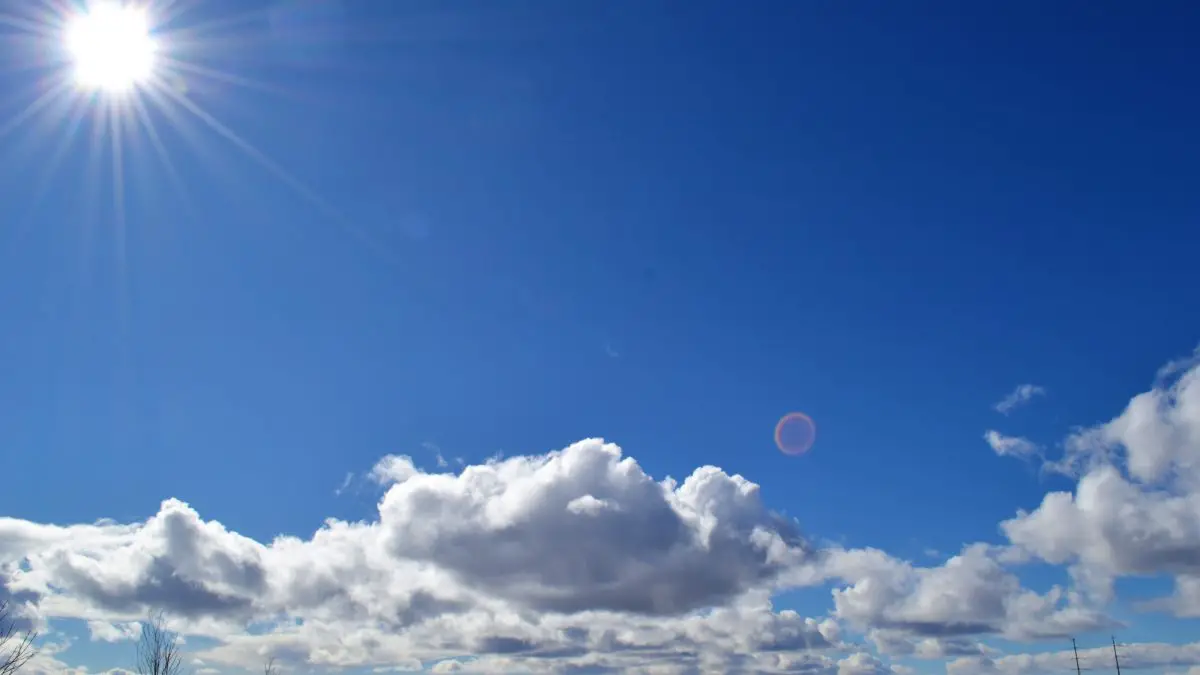In everyday conversation, weather idioms come in all forms. We have sayings to exaggerate certain weather conditions, but we also have weather expressions to describe something completely different!
British people especially love to talk about the weather, so knowing some commonly used English idioms will help you understand the conversation. Then in no time at all, you’ll be speaking and sounding more like a native.

Weather idioms to describe everyday situations
First we have some weather-related idioms that are actually used to describe different situations.
Cloud nine
Let’s start our idioms about weather with a positive one. To describe someone as being on cloud nine means they are very happy.
“Ever since she passed her driving test she’s been on cloud nine.”
Come rain or shine
If something happens (or will happen) regardless of the circumstances, you may use the phrase come rain or shine.
“He’s training for a marathon so, come rain or shine, he’s out running every day.”
“I’ll be at the festival, come rain or shine.”
In these examples it may literally refer to the weather, but it can figuratively mean that nothing will stop this from happening (or a bit of both). It’s a useful idiom to use when making plans for the future.
Every cloud has a silver lining
A lot of these weather idioms are very hopeful and positive, and here is another. It’s used to comfort people in a sad or stressful situation. To say that every cloud has a silver lining means there may be a positive outcome although it’s not clear or obvious right now.
“Sadly, she didn’t get the job. She was heartbroken but I told her, every cloud has a silver lining. Would you believe it, the next day they called her and offered her a better job!”
Head in the clouds
You can use this phrase when talking about someone who is daydreaming and not paying attention. If they aren’t focused on the task, or have unrealistic hopes and aspirations for the future, we could say they have their head in the clouds.
“Instead of revising he has his head in the clouds.”
Clouds are just one feature of idioms about nature, too.
Lightning fast
With so many weather idioms to choose from you’ll have to think fast. In fact, lightning fast! This is an example of how hyperbole and idioms overlap to exaggerate how fast a reaction or movement is.
“I love watching the Olympics. The runners are lightning fast.”
We have some more fast idioms and expressions for you to check out on a separate post.
Rain check
Can’t make an event? Trying to find a polite way of asking to rearrange something? Saying “let’s take a rain check” might just be the phrase you need. It’s a kind way of canceling something or perhaps rearranging it.
“I really wanted to come tonight but the babysitter just cancelled. Let’s take a rain check and we’ll meet next week instead.”
It’s a breeze
In the context of weather idioms (and specifically wind idioms), this phrase describes something that is easy, effortless, and trouble-free.
“Wow! I studied all night for that exam and it turned out to be a breeze!’
Of course, it’s a breeze may also refer literally to a gentle, pleasant wind.
Snowed under
This is an example of a weather idiom which can describe a situation caused by the weather, or something unrelated.
If it has snowed a lot and perhaps you can’t see your car, you may say that it’s snowed under. On the other hand, if you are very, very, very busy, you would use this phrase to emphasize how much you have to do.
“I have 2 meetings, 100 e-mails and a report due by 5 pm. I’m completely snowed under!”
This also appears on our list of snow and winter idioms.
Steal someone’s thunder
This isn’t a very nice thing to do as when you steal someone’s thunder you’re taking away the attention from them, normally for your own personal gain.
“I don’t mean to steal your thunder but I did get a better part in the school play.”
The calm before the storm
The calm before the storm is said when all seems peaceful but perhaps something loud or destructive is about to happen.
“I’m just enjoying the calm before the storm as my grandchildren will arrive soon.”
This saying is likely to come from observing how the weather behaves before a real storm. It’s often quite peaceful, still and quiet before a thunderstorm arrives.
We mention a few rain and storm idioms here, but there are many more for you to discover.
Under the weather
The expression under the weather may either show that someone isn’t feeling well or that they’re in low spirits.
“I can’t come in to work today. I’m feeling a bit under the weather.”
Want to know some more health-related idioms?
Weather the storm
You may hear this saying as either weather the storm or ride out the storm, but both have the same definition. It’s used when you’re trying to get through a difficult period in your life.
“It’s been a hard year for him but he’s weathered the storm and things are getting better.”
This phrase is believed to allude to ships sailing through bad weather but still making it back safely to port.
Storm in a teacup
When somebody gets angry, upset, or worried about something relatively insignificant, you could describe it as a storm in a teacup or a tempest in a teacup.
“All this fuss about the new parking restrictions is just a storm in a teacup, if you ask me.”
Check out some more idioms about tea here.

Idioms about weather
Now we come to idioms that are used to describe weather conditions and particularly emphasize extremes.
Brass monkey
If you need to highlight how cold the weather is, you could describe it as brass monkey. This would only be used when the weather is really freezing cold – and is a typically British idiom.
“It’s a typical brass monkey January morning.”
This is a more polite version of another phrase along the lines of “It’s cold enough to freeze the ears [or another more vulgar body part] off a brass monkey.”
It’s Arctic
Following on nicely is another expression about cold weather. You’d say it’s Arctic for extremely cold, icy weather.
“We’d better wrap up warm, it’s Arctic out there.”
There are more fun, cold-related idioms for you to discover here.
It’s boiling
Not all idioms for weather describe cold days. Saying it’s boiling in fact refers to very hot weather, as is often experienced during summer.
“There is no way I’m going outside for a walk, it’s boiling out there.”
It’s bucketing down
This is one of the many idioms for weather we have to describe rainy and wet conditions. If it’s raining very hard we could say it’s bucking down.
“I was out running when it started bucketing down.”
Would you like to know some other ways to describe the rain?
Lovely weather for ducks
Here’s number two of our weather idioms about rain. What would be considered lovely weather for ducks? Lots and lots of rain! This would normally refer to longer periods of rain, not necessarily how heavy the rain is.
“I can’t believe the bad weather we’ve been having but at least it’s lovely weather for ducks.”
Raining cats and dogs
When it’s raining cats and dogs it’s safe to say it’s raining a lot. You could use either this phrase or it’s bucketing down as they both refer to lots and lots of heavy rain.
“Quick, get inside, it’s raining cats and dogs out there.”
If you’d like to know where this saying comes from, take a look at some of these suggestions. Also check out our articles with plenty more dog idioms and cat idioms.
As you can see, there are plenty of idioms about weather, in fact we could say that our list is just the tip of the iceberg. (This means there is more than what you see in front of you!) Don’t let the conversation stop yet; drop us a comment and let us know which ones you’re going to use today.




Your brass monkey idiom is incorrect. It is not the monkey who is freezing. He is about to lose certain parts of his anatomy due to the cold. We may say it’s brass monkeys out there but it is referring to the complete idiom. Its cold enough to freeze the ….. off a brass monkey.
Don’t try to change idioms.
Can’t spell Arctic either.
Thanks for pointing this out, Tarj. We’ve corrected the spelling mistake.
Every cloud has a silver lining